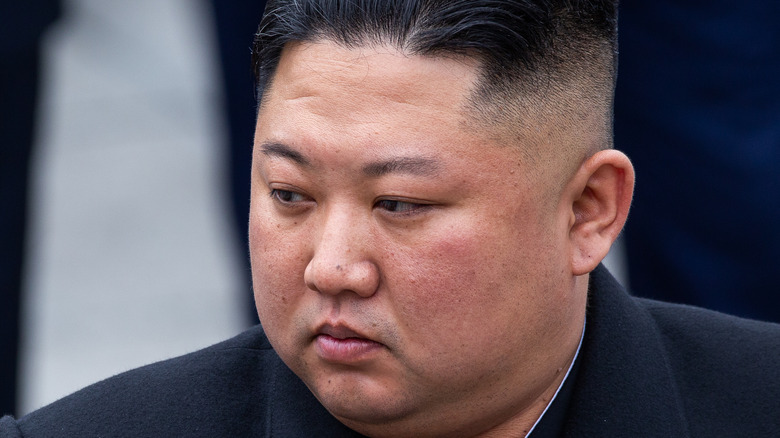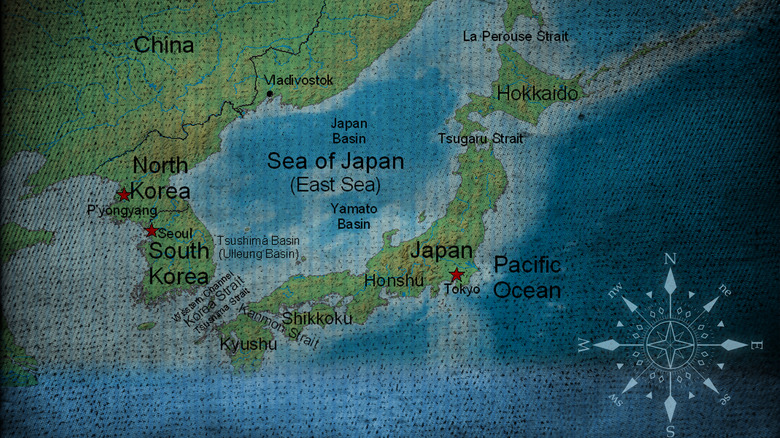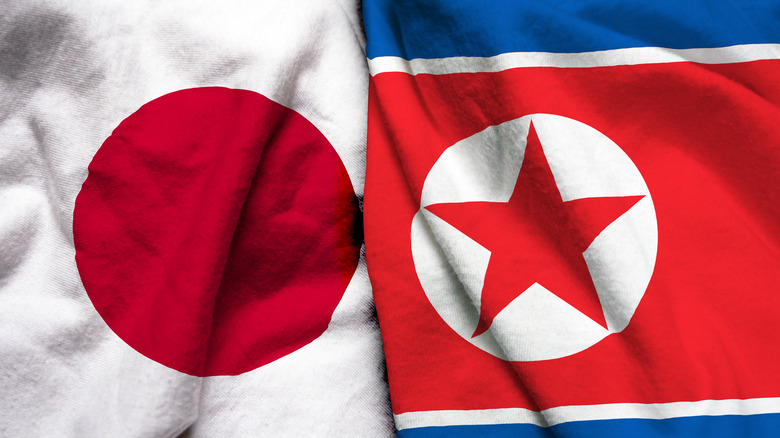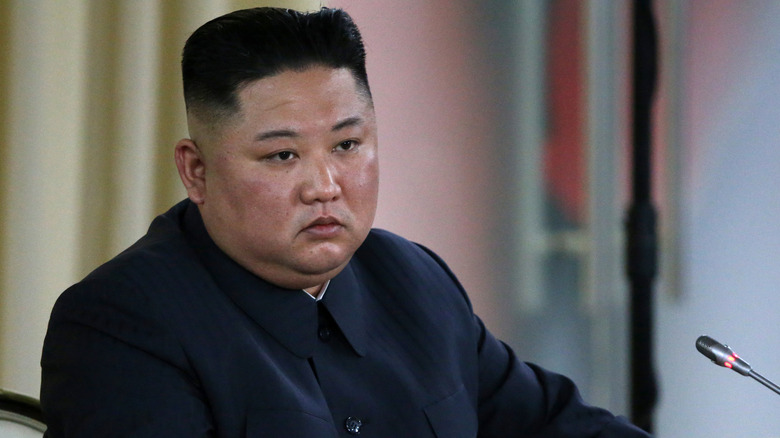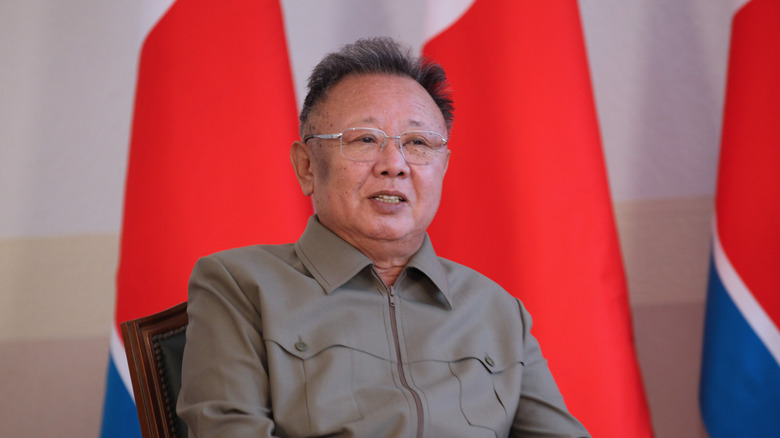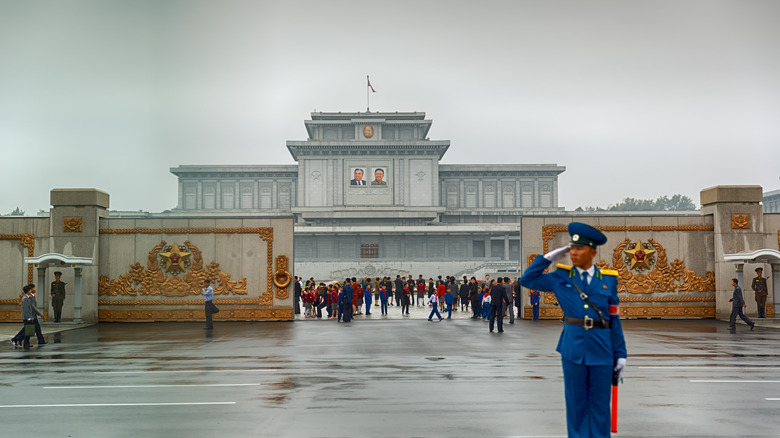The Dark History Of The Woman Who Raised Kim Jong Un
Kim Jong Un, the supreme leader of the Democratic Republic of North Korea, is one of the most famous public figures across the world. However, despite his global fame (or infamy, some might argue), the backstory of his lineage remains under the radar. While his father was Kim Jong Il, the previous leader of North Korea, information about his mother, Ko Yong Hui, is "a tightly guarded secret in the country," noted The New York Times. The mystery around her has continued, even after her death in 2004.
According to NK News, a media website run by North Korean defectors, part of the reason that Ko remained out of the spotlight is that her in-laws did not approve of her. For starters, she had been working as an actress and dancer when she first met Kim Jong Il in the 1970s, and though her occupation has never directly been attributed to her frosty welcome, it was definitely not the hard-working housewife and worker background that was idealized by the Communist regime.
The rift between Ko and her in-laws was apparently bitter enough that Kim Jong Un sought revenge on behalf of his mother following his ascension to the chairmanship. According to The New York Times, Kim blamed his uncle for aggravating the bad blood, and had him executed in 2013 for "preventing Ms. Ko from befriending his paternal grandfather." That said, Ko had a bigger so-called shortcoming in the eyes of the North Korean elite: a half Japanese bloodline.
Kim Jong Un's mother had a racial background that was a major issue
Though North Korea, South Korea, and Japan are neighbors geographically, they share a bitter history with one another — especially throughout the 20th century. The Korean peninsula was colonized by Japan in 1910 after years of aggression. But the term colonization does not fully describe the all-out culture war that Japan waged against the Korean people.
For example, the Korean language was forbidden in schools and public places, and historical documents were routinely burned. Things only got worse upon the outbreak of World War II. Japanese families were given the farms and property of Koreans. Meanwhile, Korean men were sent to different islands to become laborers, while women were trafficked into sex slavery under the euphemism "comfort women," per History.
In fact, it is possible that Ko was the product of a comfort woman's time with a Japanese man — though this is pure speculation. Other sources have claimed that Ko actually was the daughter of a Japanese woman and a Korean laborer who had been sent to Osaka to work in a sewing factory, per Pantheon.
However, what is known is that she was born in Japan and of half-Japanese and half-Korean heritage. This alone made her undesirable due to her connection to a country widely considered at the time to be Korea's chief historical oppressor.
Ko's Japanese heritage was rebranded as a symbol of anti-Japanese struggle
While it seems as if the solution to Ko's background was to keep her out of the spotlight, there were some attempts to recuperate her image starting in 2002. That said, most of this publicity push was reserved for the small circles of North Korea's elite instead of the population at large.
Part of this was because Ko had achieved enough fame in her youth as an actress that her name — and thus her link to Japan — was recognizable. According to NK News, this issue was skirted by referring to Ko as the "respected mother" of Kim Jong Un and his siblings or as the "comrade" of Kim Jong Il — titles that conveniently didn't use her name.
Moreover, the propaganda documents and films consistently emphasized her loyalty to North Korea as a constant refrain; one film short was even titled "The Respected Mother is the most faithful of the faithful, endlessly loyal to the Beloved and Respected comrade Supreme Commander." Other clips showed Ko with a pistol, ready to fight North Korea's enemies.
The focus on loyalty to North Korea and her husband served a second purpose: demonstrating a successful tale of "Anti-Japanese" struggle. "She is exactly the same as the Heroine of the Anti-Japanese struggle respected comrade Kim Jong Suk, she is the great example for all of us to learn from," declared another propaganda piece.
Even Ko's duties as a mother were kept under wraps
Though Ko may have been referred to as a "mother," little is actually known about her relationship with her son, Kim Jong Un. The best descriptions available come from Ko's sister and brother-in-law, who defected to the United States after Ko's death.
In an interview with The Washington Post, Ko's sister painted a picture of both normalcy and paradox. In some ways, Kim Jong Un seemed like a normal boy, especially during his time at a boarding school in Switzerland. Kim's aunt described how Ko would take Kim Jong Un to Disneyland Tokyo and how she indulged his passions, such as his obsession with basketball.
However, Ko's sister also noted how Ko found it difficult to punish her son, especially when he began to realize his position of power in the North Korean regime. Interestingly, when he disobeyed orders, he did so in unusual ways.
"He wasn't a troublemaker, but he was short-tempered and had a lack of tolerance," Ko recalled. "When his mother tried to tell him off for playing with these things too much and not studying enough, he wouldn't talk back, but he would protest in other ways, like going on a hunger strike."
However, some reports claim Ko pulled strings behind the scenes
Despite the secrecy surrounding Ko's background, motherhood, and life in general, some reports have claimed that she pulled a lot of strings behind the scenes. North Korean experts have noted that Ko acted as the First Lady of North Korea from the 1990s and onwards, despite her relatively mysterious persona.
"In contrast to his other wives and common-law partners, Ko actually took an interest in Pyongyang's palace politics," detailed a BBC article on the North Korean regime. "Ko was ambitious. She befriended the close aides and generals that made up her husband's entourage," it continued.
However, the evidence that Ko had more clout than previously realized is that she managed to position her own son as the heir to the DPKR, rather than Kim Jong Il's oldest son from his first wife. This son, Kim Jong Nam, was originally considered the successor before being sidelined in 2001. He was exiled from the country in 2003 then assassinated in Malaysia in 2017, per The Guardian.
Ko's death gives just as few clues as her life
Though it seemed that the DPRK government had been attempting a mild publicity push for Ko in the early 2000s, it was a short-lived endeavor as Ko died in 2004, per The Korea Times. The details around her death are as murky as those surrounding her life.
According to The Mirror, most sources believe that she died in Paris of an illness, most often cited as breast cancer. However, other reports have claimed that she was simply treated for her mystery illness in Paris and managed to return to Pyongyang in the late spring or summer of 2004. Those reports claim that she fell into a coma and died that August.
It is believed that Ko's death was not widely publicized throughout the DPKR, and Kim Jong Il publicly moved on with a new partner, Kim Young-sook, after Ko's passing." After Kim Jong Il died in 2011, Ko's name became an "official state secret," ensuring that future generations will likely know as little about her as known today.
